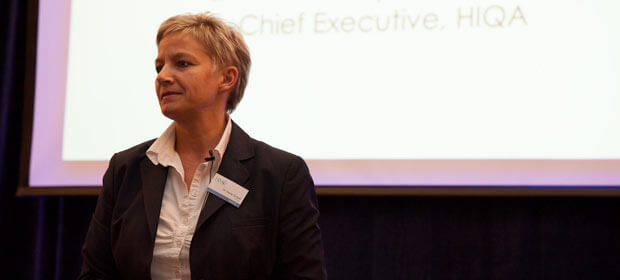Global statistics show that those who access healthcare have a one in 300 chance of being harmed, Dr. Tracey Cooper, Chief Executive, HIQA and acting Chief Inspector of Social Services told the HMI Conference, Maureen Browne reports.
She said that ten per cent of hospital patients suffered an adverse event each year (UK, New Zealand, Canada and Europe), 1.4 million hospital patients worldwide acquired healthcare associated infections, 100,000 cases of HAI leads to 5,000 deaths a year (UK), 8,000 hospital deaths every year are through medical error (USA) and unsafe injections cause 1.3 million deaths annually.

There was a one in a million chance of a traveller being harmed while in an aircraft and there was a one in 300 chance of a patient being harmed when s/he accessed healthcare.
She said that when money was tight and we were trying to develop health services, safety was absolutely paramount – getting it safe and keeping it safe. When we knew that it was safe we could build quality, effectiveness and efficiency.
She said that we could not accept the type of service where numbers of people arrived into a clinic at 9 am, were given a ticket, waited until the clinic broke for lunch and then joined the afternoon queue. “This is not about modern jargon, but about a duty of care to provide optimum care for our patients.”
We had to focus on safety, quality, effectiveness, efficiency, informed decision making and a culture of learning and sharing good practice.
There was a one in a million chance of a traveller being harmed while in an aircraft and there was a one in 300 chance of a patient being harmed when s/he accessed healthcare
We had to understand the priorities for healthcare – to align policy, strategy and resources to focus maximum overall population benefits for resources available, to engage with managers, clinicians and patients to mobilise for quality improvement initiatives, (building a quality and safety momentum) to clarify expectations for safe service and quality assurance and to make hard decisions for the right reasons
Dr. Cooper said from a governance and management point of view there were criteria for boards and executives.
A Board should be of appropriate size and competence, there should be no vested interests, it should set strategy and monitor its execution, patient safety should be on every agenda, it should effectively hold the executive to account, seek assurance and receive metrics; patient safety/quality/access/financial/compliance, ensure effective relationships, be open and transparent and ask questions to which they did not want to hear the answers.
The executive should have an appropriately qualified and experienced CEO and directors, there should be clearly delegated accountability and authority, there should be robust individual performance management of objectives aligned to strategy and development for CEOs, Directors and staff, there should be mechanisms to address poor performance, effective arrangements to monitor and manage delivery of services, (safety, quality, risk, KPIs, budgets) and to ensure effective relationships with patients, public, community and agencies.
Dr. Cooper said that the current challenges facing our health service were:
- A Cultural change – the patient is our raison d’être
- Overly complicated and often ineffective governance and oversight
- Ambiguous accountability, responsibility and authority
- The need to improve our use of information to drive reliability, high performance and inform decision making
- The need to build capacity and capability and develop competent managers to executive high quality and safe care
- The need to actively design efficiency into our services and to modernise historical work practices for maximum patient benefit,
- The need to better manage change in constrained times
- The need to know our business better – be more reliable.
“I think we sometimes overly complicate a lot of what we do, because it is very confusing. Sometimes it is survival tactics that often lead to ineffective governance and significant challenges to oversight.We are appalling at using information. In this country, we can’t even tell how many people die unavoidably. If we are not measuring and comparing and contrasting then we have a real problem on our hands. We need to know our business better and in four to five years we could be a good healthcare system.
We need to develop competent managers to execute high quality and safe care. If we are not investing in managers and leaders of the future, what are we doing? We will be in crisis mode for the next ten to 20 years.
“We need strategic and operational leadership. We must make sure we connect national priorities to operational matters that people know what is expected of them. We must clarify what is expected and demonstrate and manage it. If we are not managing how well we are performing, how are we managing the service we are providing?
“We need to develop competent managers to execute high quality and safe care. If we are not investing in managers and leaders of the future, what are we doing? We will be in crisis mode for the next ten to 20 years.”
Dr. Cooper said the quality improvement journey encompassed the following:
- 2012 – Monitor PCHAI standards
- 2012 – Monitor child projection services
- 2012 – Support safety and quality improvement
- 2012/2013 – Support to implement SBCH standards
- 2012/2013 – Develop hospital groups and establish boards
- 2013 – Monitor for improvement hospital based/ambulance services
- 2013 – Define the strategic approach to quality assuring primary care services
- 2015/2016 – Licensing of hospital system
- 2013 – Registering and monitoring services for people with a disability.
- 2013 – Registering and monitoring children’s special care units

